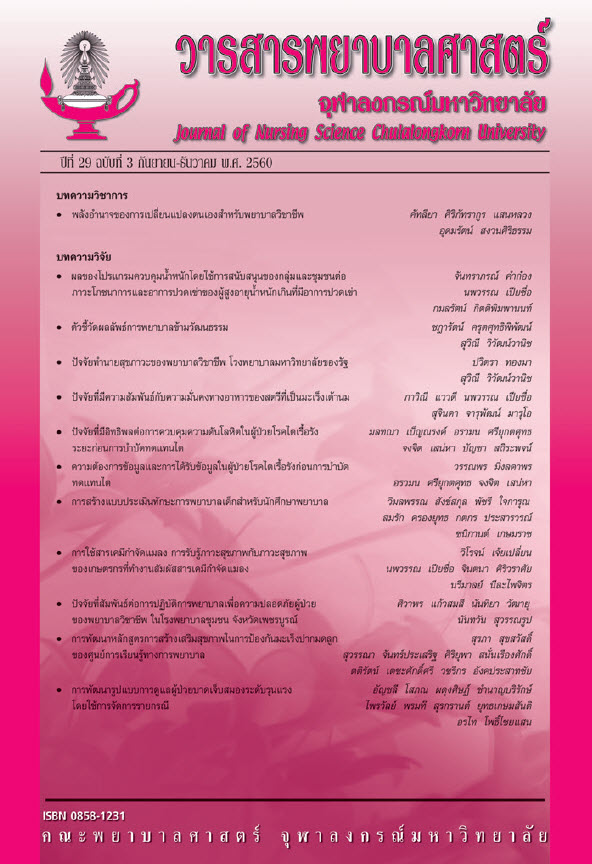Factors Predicting The Well-Being of Registered Nurses in University Hospitals of The Government
คำสำคัญ:
ปัจจัยทำานาย, สุขภาวะ, พยาบาลวิชาชีพบทคัดย่อ
วัตถุประสงค์: เพื่อศึกษาปัจจัยทำนายสุขภาวะของพยาบาลวิชาชีพ โรงพยาบาลมหาวิทยาลัยของรัฐ แบบแผนงานวิจัย: การวิจัยแบบความสัมพันธ์เชิงทำานาย
วิธีดำเนินการวิจัย: กลุ่มตัวอย่าง คือ พยาบาลวิชาชีพทุกระดับที่ปฏิบัติงานในโรงพยาบาลมหาวิทยาลัยของรัฐ จำนวน 361 คน คัดเลือกกลุ่มตัวอย่างด้วยวิธีการสุ่มแบบหลายขั้นตอน รวบรวมข้อมูลโดยใช้แบบสอบถาม ประกอบด้วยข้อมูลส่วนบุคคล บรรยากาศความปลอดภัยในการปฏิบัติงาน ความเครียดในงาน และสุขภาวะของพยาบาลวิชาชีพ มีค่าความตรงตามเนื้อหาระหว่าง .85 - .95 และค่าสัมประสิทธิ์ แอลฟาคอนบราคเท่ากับ .90, .82, และ .92 ตามลำดับ วิเคราะห์ข้อมูลโดยใช้สถิติร้อยละ ค่าเฉลี่ย ส่วนเบี่ยงเบนมาตรฐาน ไคสแควร์ สัมประสิทธิ์สหสัมพันธ์ของ Pearson และวิเคราะห์การถดถอยพหุคูณแบบ เป็นขั้นตอน
ผลการวิจัย: 1) สุขภาวะของพยาบาลวิชาชีพโดยรวมอยู่ในระดับดี ( = 3.84, SD = 0.80) 2) อายุ รายได้ และบรรยากาศความปลอดภัยในการปฏิบัติงาน มีความสัมพันธ์ทางบวกกับสุขภาวะของพยาบาล วิชาชีพอย่างมีนัยสำคัญทางสถิติ (r = .18, .25, .38 ตามลำาดับ, p < .05) ส่วนความเครียดในงานมีความสัมพันธ์ทางลบกับสุขภาวะของพยาบาลวิชาชีพอย่างมีนัยสำคัญทางสถิติ (r = -.24, p < .05) 3) บรรยากาศความปลอดภัยในการปฏิบัติงาน รายได้ และความเครียดในงาน สามารถร่วมกันพยากรณ์ สุขภาวะของพยาบาลวิชาชีพได้ร้อยละ 21.3 อย่างมีนัยสำคัญทางสถิติที่ระดับ .05
สรุป: ผู้บริหารทางการพยาบาลควรส่งเสริมให้พยาบาลวิชาชีพมีสุขภาวะที่ดีทั้ง 5 ด้าน ได้แก่ ด้านร่างกาย จิตใจ สังคม อารมณ์ และจิตวิญญาณ โดยส่งเสริมให้มีการจัดบรรยากาศความปลอดภัยในการปฏิบัติงาน จัดให้มีการลดความเครียดในงาน และสนับสนุนให้พยาบาลวิชาชีพมีรายได้ที่เหมาะสมเพียงพอ



